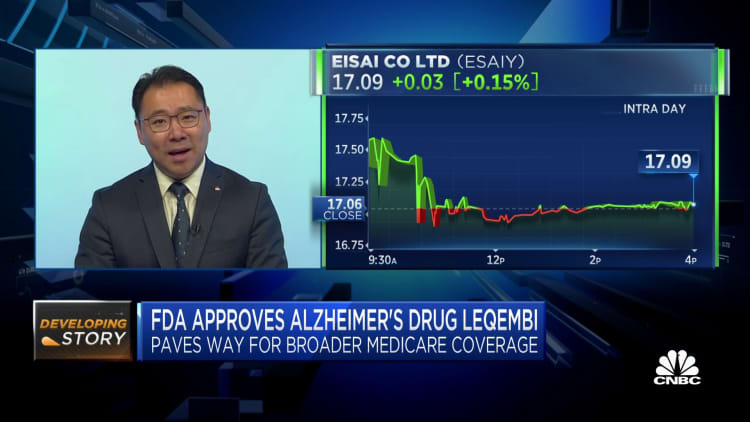Signage for Eisai Co. at the company’s headquarters in Tokyo, Japan, on Friday, Feb. 3, 2023.
Bloomberg | Bloomberg | Getty Images
Shares of Japanese pharmaceutical giant Eisai sank Friday after the company’s Alzheimer’s drug was formally approved by U.S. regulators overnight, prompting questions over investor sentiment surrounding the move.
Tokyo-listed shares of Eisai fell by more than 8% at one stage during Friday trade as investors assessed the U.S. Food and Drug Administration’s approval of Leqembi, which is jointly produced by its U.S. partner Biogen. Eisai shares closed 4.67% lower after paring some of its earlier losses.
Leqembi is the first Alzheimer’s antibody treatment to receive full FDA approval. It is also the first such drug that is to receive broad coverage through Medicare.

The closely watched drug has prompted debate between medical and market experts.
University of Cincinnati College of Medicine’s neurologist Dr. Alberto Espay told NBC News that the treatment of the drug, specifically the slowing in the progression of the illness, falls below the level that would be considered “noticeable” to a patient.
“The odds for brain swelling and hemorrhage are far higher than any actual improvement,” Espay, who launched a petition in June calling for the Alzheimer’s treatment to not get full approval, told NBC News.
Eisai U.S. CEO Ivan Cheung refuted such similar concerns in an interview with CNBC’s “Fast Money.”
“This treatment is safe and effective for Alzheimer’s disease,” Cheung said Thursday.
“The benefit risk profile is well established from the large late stage clinical trial and we believe in year three, about 100,000 individuals could be diagnosed and eligible for this important treatment,” he said.

Naomi Kumagai, senior equity analyst at Mitsubishi UFJ Morgan Stanley Securities, told CNBC via email that a number of factors were at play in relation to Eisai’s share price.
She referenced a June 1 announcement from the Centers for Medicare and Medicaid Services outlining how people could access Leqembi once FDA approval had been granted, as well as a positive outcome from an advisory committee on June 9.
Given the above, “we think all the positives are built in the share price, thus the shares are down today, in our vie[w],” Kumagi said.
In order to see a “solid uptake” of the drug, Kumagi highlighted three key areas, noting that they would not happen in the short term.
The first would be the approval of a subcutaneous injector formulation, which would offer a more convenient way of administering it.
The second and third would be the commercialization of a blood biomarker to detect amyloid beta accumulation, and the reimbursement of such a blood biomarker.
